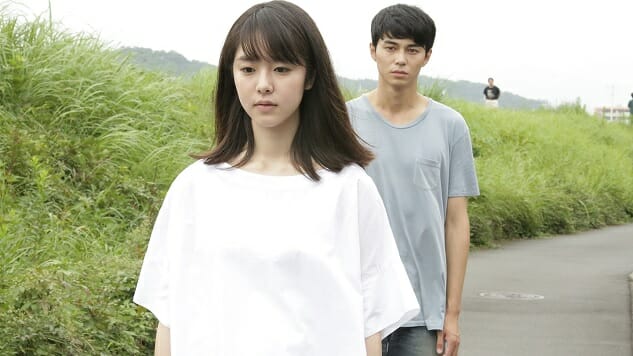A tale as old as time: Girl meets boy; girl and boy fall head over heels; boy has an exhausting habit of meandering off for days at a time without explanation, and on one such walkabout never comes back home; girl grieves and moves on; girl meets a second boy who bears an eerie resemblance to the first, falls in love all over again, and then the first boy comes back into the picture and mucks everything up.
This is the stuff of Asako I & II, the latest film from Ry?suke Hamaguchi, based on the novel Netemo Sametemo by Tomoka Shibasaki. By the greatest and most unexpected of coincidences, it’s also the latest 2019 release fixated on a doppelgänger, following Jordan Peele’s Us and Lee Cronin’s The Hole in the Ground. Rather than horror, Hamaguchi approaches the subject through romantic drama peppered with a dash of wry humor: The meet-cute and timid first kiss shared between his demure title character, Asako (Erika Karata), and her original lookalike paramour, Baku (Masahiro Higashide), for instance, is accompanied by a fireworks display, but on a small, meager scale, staged by loitering teens punctuating the beat with the pathetic bang-snap of their artillery discharge.
Little details like this fill out the film’s haunting calm, Hamaguchi’s way of undercutting the threat of encroaching melancholia. Asako I & II is unavoidably sad; within its opening 20 minutes, Hamaguchi plots out an entire love affair all the way to its time of death, the moment where Baku simply vanishes from Asako’s life, seemingly forever. Baku’s a beautiful, good-natured clod with negative common sense and an aggravating knack for turning bad situations into better situations through dumb luck and dumber timing. There’s no magic in Asako I & II, but there’s magic to the arc of his life, and that, perhaps, makes his disappearance cut deeper and Asako’s grief hit harder while sparing overwrought lugubriousness.
Asako I & II is an easygoing movie, at least if the film’s exterior is taken at its words. Under the hood, it’s roiling. Hamaguchi gives attention to what the characters say as much as what they don’t, contrasting spoken dialogue with his cast members’ expressions and body language, a divide best exemplified by Asako’s introduction to Ryohei (also Higashide), Baku’s equally as handsome but considerably more sensible doppelgänger; Ryohei works for a sake company, he wears his hair much shorter than Baku and he also doesn’t suffer from wanderlust. Most of all, he really likes Asako. She likes him too, she just can’t talk to him about her root attraction to him, even if her eyes and face say enough on their own.
By comparison, others say too much. Kosuke (K?ji Seto), Ryohei’s work friend, comes to dinner with Ryohei, Asako and Asako’s friend Maya (Rio Yamashita), an aspiring actor. Kosuke watches a clip of her performing, and betrays his own feelings in trying to keep his mouth shut. When he’s called on his reticence, he ends up hurting Maya’s feelings. But Asako I & II doesn’t argue that this is a bad thing: Time passes, Kosuke and Maya get married, and they have a child. If anything, the film urges honesty, with others as well as oneself, above all else. Asako knows this lesson well. Karata’s finely tuned lead performance invites the audience to observe her inner struggle over telling Ryohei the truth. It takes Baku’s reemergence in her life to force that struggle out into the world, with obvious consequences.
“I feel like I’m dreaming right now,” Asako muses to Baku following a particularly cold and ill-fated decision. “No: Everything up until now feels more like a long dream. It was a really happy dream. I felt like I’d matured. But now I’m awake, and I haven’t changed at all.” Unlike so many romantic dramas, Asako I & II doesn’t treat relationships as agents for self-actualization or personal growth, at least not on their own. Hamaguchi spurns the notion that being in a relationship provokes change sans necessary legwork. Asako’s illusions of maturity are hers alone. Telling Ryohei about Baku might’ve avoided the circumstances she finds herself in during the film’s final act, and in fairness, Asako does tell him. Also in fairness, she only tells him after he’s already figured it out himself. Whoops.
That’s not how relationships function, though. Asako I & II is an unassuming, quiet movie, so Hamaguchi’s ultimate realizations come as a blindside, even if, boiled down to their basics, they’re somewhat mundane. Love takes work. Relationships take work. But the work necessary to sustain love and relationships tends to be the hard work people do on themselves. Being in love is easy. Staying in love is infinitely more difficult, especially when your love is metaphorically bifurcated. People don’t end up in the existential crisis Asako wrestles with throughout the movie every day, but every day, people do make the conscious choice to love, and making that choice requires an honesty that Hamaguchi’s protagonist rejects.
Asako I & II remains sympathetic to its namesake. It’s too gentle a film to judge her. It’s also too idiosyncratic, and yes, it’s even too honest. What would anyone do in Asako’s shoes? Would they make the right choice? What is the right choice? The film denies easy answers. Maybe there aren’t any for people seeing double.
Director: Ry?suke Hamaguchi
Writers: Ry?suke Hamaguchi, Sachiko Tanaka, Tomoka Shibasaki
Starring: Erika Karata, Masahiro Higashide, K?ji Seto, Rio Yamashita, Sairi Ito
Release Date: May 10, 2019
Boston-based culture writer Andy Crump has been writing about film and television online since 2009 (and music since 2018). You can follow him on Twitter and find his collected writing at his personal blog. He is composed of roughly 65% craft beer.
